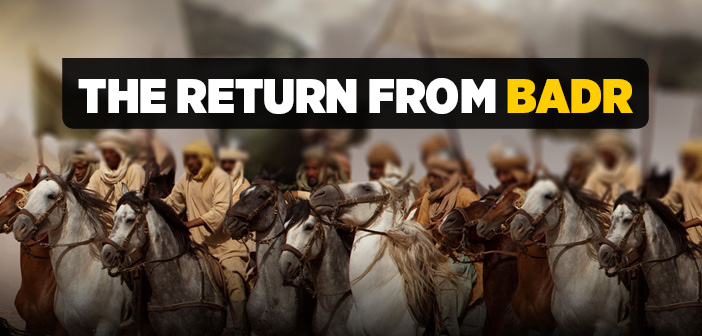What is the repentant three?
There were three groups of males who did not participate in the Tabuk Campaign. They were:
1) Those with legitimate excuses who, as declared by the ayah, could not join because of a lack of means, despite desperately wanting to. About them, the Blessed Prophet -upon him blessings and peace- said to his Companions, “There are such people in Medina that there is not a single valley we tread without them being with us! It is only their (justified) excuses that have left them behind.” (Bukhari, Maghazi, 81; Muslim, Imarah, 159)
In another hadith, the Prophet of Allah -upon him blessings and peace- indeed declares, “Deeds are according to intentions…” (Bukhari, Bad’ul-Wahy, 1)
2) The hypocrites. Together with many other excuses, their main reason for staying behind was their conviction that the Blessed Prophet -upon him blessings and peace- would not in any way return from Tabuk. But seeing the Prophet -upon him blessings and peace- return safe and sound, over and above the other successes attained during the Campaign, they straightaway rushed to him, and making up lies for excuse, apologized. These hypocrites, around eighty in number, became subject to Divine Revelation:
“And they swear by Allah that they are most surely of you, and they are not of you, but they are a people who are afraid (of you). If they could find a refuge or cave or a place to enter into, they would certainly have turned thereto, running away in all haste.” (at-Tawbah, 56-57)
“They will excuse themselves to you when you go back to them. Say: Urge no excuse, by no means will we believe you; indeed Allah has informed us of matters relating to you; and now Allah and His Messenger will see your doings, then you shall be brought back to the Knower of the unseen and the seen, then He will inform you of what you did. They will swear to you by Allah when you return to them so that you may turn aside from them; so do turn aside from them; surely they are unclean and their abode is hell; a recompense for what they earned.” (at-Tawbah, 94-95)
With these revelations, the hypocrites were effectively banished from Muslim society. Labeled as ‘unclean’, they were no longer considered to be Muslims. They were also banned from taking part in all causes in the name of Islam.
3) Those without any excuses not to join. They stood under two groups:
a) Those who did not take part in the Campaign, despite not being hypocrites and not having any legitimate excuses. Yet, before the Prophet of Allah -upon him blessings and peace- returned from the Campaign, they realized their error and became deeply remorseful. As self-punishment, they tied themselves to the posts of the Masjid and vowed to remain in that state until the Blessed Prophet -upon him blessings and peace- came and personally untied them. The Noble Messenger -upon him blessings and peace- was told of these men upon return, regarding which he stated, “And I promise not to untie them until I receive an according command.” Revealed thereupon was the below ayah:
“And others have confessed their faults, they have mingled a good deed and an evil one; may be Allah will turn to them (mercifully); surely Allah is Forgiving, Merciful.” (at-Tawbah, 102) The Blessed Prophet -upon him blessings and peace- then proceeded to untie the Companions who had tied themselves to posts out of remorse.
b) Those who, again, had not joined the Campaign despite neither being hypocrites nor having legitimate excuses to fall back on, yet who remained separate from the others who had tied themselves to the posts of the Masjid. They were three in number: poet Kaab ibn Malik, Murarah ibn Rabi and Hilal ibn Umayya. Unlike the hypocrites, they did not lie but instead confessed to the Blessed Prophet -upon him blessings and peace- that they had no justified excuse for not joining the cause. With an inexpressibly profound remorse over their failure to join, they pleaded the Prophet of Allah -upon him blessings and peace- for forgiveness.
The Blessed Prophet -upon him blessings and peace-, incredibly sensitive to abide by Divine commands, did not immediately forgive the three. Furthermore, as he was waiting for a Revelation that would disclose their fate, he did not even speak to them. The Companions, who regulated their behavior in line with the Prophet’s -upon him blessings and peace- at all times, did the same.
The three Companions had taken part in all the previous battles; except for Kaab -Allah be well-pleased with him-, who was absent only at Badr. The world had suddenly narrowed in their eyes, constricting their hearts, now that they were ignored by the entire Muslim society because of their misjudgment in remaining behind from Tabuk. Worst of all was the fact that the Blessed Prophet -upon him blessings and peace- had shunned them to a point where he did not even respond to their greetings. The entire earth had become estranged; even their wives were like strangers. There was nothing they could do about it, except for weep, day and night. They were like melted candles from their incessant crying. They had done a mistake but that did not distance them from being sincere, upright; neither did it shake their trust in Allah, glory unto Him, nor did it divert them away from remorse and repentance. Fifty days had gone by when they were finally rewarded for their honesty and genuine repentance in the form of the below ayat:
“And to the three who were left behind, until the earth became narrow to them notwithstanding its spaciousness and their souls were also straitened to them; and they knew it for certain that there was no refuge from Allah but in Him; then He turned to them (mercifully) that they might turn (to Him); surely Allah is the Oft-returning (to mercy), the Merciful. O you who believe! Be careful of (your duty to) Allah and be with the true ones.” (at-Tawbah, 118-119)
The Blessed Prophet -upon him blessings and peace- gave the good news to Kaab ibn Malik -Allah be well-pleased with him- with the words, “I give you the glad tidings of your happiest day since the day you were born!”[1]
“Then, Messenger of Allah”, said Kaab ibn Malik -Allah be well-pleased with him- to express his gratitude, “I want to give away my entire wealth as charity for the sake of Allah and His Messenger!”
“Better you hold on to a portion of your wealth”, advised the Blessed Prophet -upon him blessings and peace-.
“In that case, I will hang on to my share from Khaybar”, said Kaab -Allah be well-pleased with him-, before adding, “It was only because of my honesty that Allah saved me from this plight. So, Messenger of Allah, I shall speak nothing but the truth for the rest of my life!”
Kaab -Allah be well-pleased with him- says:
“By Allah, the greatest gift Allah the Almighty gave me after I was honored with the acceptance of Islam was to allow me to speak the truth in the presence of the Messenger of Allah and thereby save myself from being among the others who perished. For Allah the Almighty said the harshest words about those who made up excuses and remained behind from Tabuk, declaring:
‘…so do turn aside from them; surely they are unclean!’” (at-Tawbah, 95) (Bukhari, Maghazi, 79, Wasaya, 16, Jihad, 103; Muslim, Tawbah, 53; Musafirin, 74)
The three Companions were beset with a punishment of such immense calibre for having stayed back just from one campaign, in spite of having been by the side of the Blessed Prophet -upon him blessings and peace- in virtually all the previous battles. The incident serves as a great precaution for those who, without a legitimate excuse, remain on the outer in the struggle of tawhid in the way of Allah, glory unto Him.
What an enormous lesson there indeed is that a man should carry the appellation of a ‘Companion’ and come face to face with death at numerous battles, first and foremost at Badr, and then become subject to the heaviest censure for being absent in an arduous yet bloodless campaign like Tabuk! Not only is there an incredible lesson in this for those with a thread of understanding, the incident also carries terrifying meaning and consequence. Considering that struggling for the triumph of Islam is a must in this day and age, as it has been at all times, how sad it is to see the many neglectful, slow and lax to move in this regard. If a veteran of Badr is made to pay such a heavy price for neglect, we must stop and think the consequences of neglect for people like us; and compliant with the command of the Almighty, strive to be with the righteous.
In order for them to be receptive to positive influences and to shun the negative, Allah, glory unto Him, has commanded Believers to be in the company of the righteous; to be with them, to seek their closeness, to support them and not to remain distant from them in all aspects of their life. This is imperative to prevent ‘the earth from becoming narrow’, to mend the aching heart and to thereby salvage oneself from the punishment of the Almighty and remove all barriers standing in the way of attaining His pleasure. How beautifully the importance of befriending the righteous is expressed in the below couplet:
A thorn is destroyed when alone,
Yet watered when with the rose…
It is quite momentous that this command was revealed during Tabuk, the ‘Troublesome Campaign’. It is necessary to be with the righteous, not only in times of comfort, but also when they are enduring hardships, when they have set out on jihad in the way of Allah, glory unto Him. Bearing the troubles the righteous suffer, emulating them in their efforts without remaining back is absolutely essential.
Surah Tawbah, most of which concerns the Tabuk Campaign, places great emphasis on the importance of physical and spiritual jihad in the way of Allah, glory unto Him. Physical and spiritual jihad, after all, serves as the most glaring proof of a Muslim’s loyalty to the religion and at the same time sets the difference between a Believer and a hypocrite. The Almighty declares:
“Surely Allah has bought of the believers their persons and their property for this, that they shall have the garden; they fight in Allah’s way, so they slay and are slain; a promise which is binding on Him in the Taurat and the Injeel and the Quran; and who is more faithful to his covenant than Allah? Rejoice therefore in the pledge which you have made; and that is the mighty achievement.” (at-Tawbah, 111)
Another implication of this is that, at all ages, the hypocrites pose the greatest threat to Muslims, something brought to clear daylight by Surah Tawbah and the experiences of Tabuk.
[1] As Kaab -Allah be well-pleased with him- rushed towards the Blessed Prophet -upon him blessings and peace- upon receiving this wonderful news, he was intercepted by Talha ibn Ubaydullah -Allah be well-pleased with him-, who gleefully embraced Kaab and congratulated him; a genuine expression of feeling Kaab -Allah be well-pleased with him- fondly remembered for the rest of his life.
Source: Osman Nuri Topbaş, The Prophet Muhammed Mustafa the Elect II, Erkam Publications





